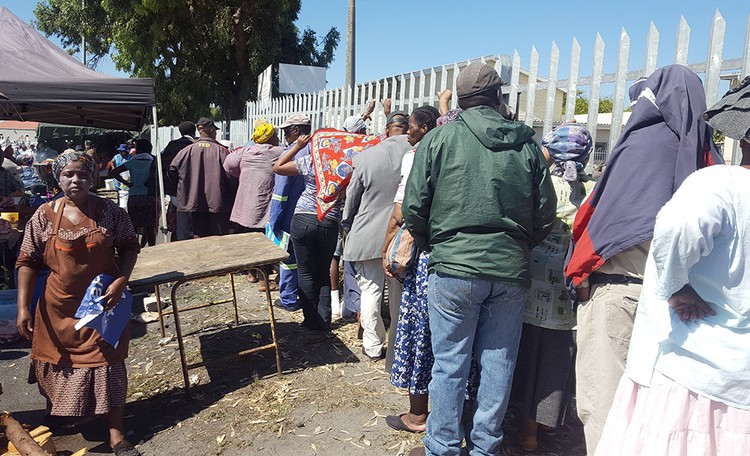Feature image: Mary-Anne Gontsana/GroundUp
South Africa’s current economic figures are better than expected.
Despite the devastation of Covid-19 and the July riots in KwaZulu-Natal and Gauteng, growth rates are up, tax revenues are higher than expected and exports are booming.
This is largely due to the fact that the middle class, ironically, now has greater spending capacity than before Covid thanks to lower interest rates and more money in their pockets because of working from home.
Revenues from mineral and mining exports have also increased thanks to rising commodity prices and while the looting and destruction that followed Jacob Zuma’s arrest are a huge cause for concern, building back has led to increasing activity over the short term.
There is also movement on the energy front, in the privatization of SAA and reform of Transnet, and some gains are being made in the fight against corruption. Finally, there is also optimism over the availability of vaccines, relieving some of the anxiety over government’s mishandling of the pandemic.
Over the short term, therefore, economists seem to agree that there is cause for a measure of optimism.
Experts participating at a closed roundtable discussion on 26 August, convened by the In Transformation Initiative, Democracy Works, the Hanns Seidel Foundation, the Kgalema Motlanthe Foundation and the Gordon Institute for Business Science, however warned that these positive factors mask the fact that there are no signs of real long term structural improvements to the economy.
For example, while mining revenue is higher than before, this is not thanks to increased volumes but global prices.
While IMF predictions for growth in South Africa is 4% this year, it will be only 2,2 % next year.
Devastating unemployment figures announced in June this year certainly stops any optimist dead in his or her tracks.
From whichever perspective one looks at it, unemployment is now just under 50% in South Africa, said one participant. “The economy might have grown, but inequality also grew.”
What are some of the solutions offered by economists participating in the roundtable?
There are very few low-hanging fruits. In fact, according to another participant, “the fruits have fallen and are rotting on the ground”.
Issues such as spectrum release seem dead in the water. This is now such a “complex mess” that it seems impossible to do, he said.
Some suggestions remain on the table.
Some believe that making visas available for highly skilled individuals – a question of liberalizing the regulatory frameworks, but also to improvements at Home Affairs – could for example go a long way to make a difference in filling the skills gap on the short term.
Importantly, several participants agreed that investment in basic education is crucial to prevent the catastrophe of “a country producing millions of school-leavers that are unemployable”. The gains of such investments, however, will only be visible ten or twenty years down the line.
One participant suggested that in some instances, government might want to experiment with partnering with the private sector by essentially paying over a small percentage, perhaps 10%, of its education budget to private schooling, which has proved to be more effective.
This might be anathema to some, but some organizations have proven that they can do education better than the state, as the health sector has done as well.
Leapfrogging to harness new technologies and improving the technocratic base of skilled employees in the public sector are also necessary going forward.
Some believe that government must invest in bulk infrastructure and inspire confidence from the private sector to invest domestically in the economy. Only then will foreign direct investment follow. “You cannot expect foreign investors to be confident if the local private sector isn’t investing,” said one participant.
Some warn, however, that public sector spending is prone to corruption.
“When is the ANC going to understand that it’s not their money?” asked another participant.
Others feel that the fight against corruption is, slowly, gaining ground. The incarceration of former president Jacob Zuma, albeit on a technically, is proof of this.
Clearly, very difficult decisions will have to be made about how to finance these much-needed reforms and to fund government investment – a predicament raised by several participants at previous Economic Roundtable discussions such as this one.
Should the state incur more debt to finance such spending or should it risk imposing budgetary constraints until such time that the economic reforms bear fruit and bring more money into government coffers to, for example, pay higher wages to civil servants?
These are issues that the country as a whole – government, private sector, and individuals – has not yet agreed on. These diverging narratives and solutions prevent the country from having a focused approach on what needs to be done, said some of the participants.
Meanwhile, economists are watching out for “economic landmines” that may lie ahead, such as the explosive Section 25 – debate around expropriation without compensation.
A lot is also happening behind the scenes that give hope to participants. Good work is for example being done by Operation Vulindlela, launched by President Cyril Ramaphosa as part of the country’s economic recovery plan, to drive change towards more inclusive growth by tackling problematic issues head on.
It is debatable though whether these reforms will happen fast enough to remedy the deep structural problems, especially at local level.
Will the youth and the next generation be more driven, more informed and able to fix what this generation has not been able to fix?
And will there be the necessary consensus over what to do and what to do first?

